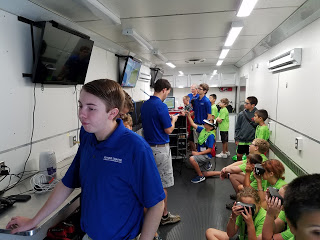#techmaker18
summer boot camp is a wrap. What a week. 100 kids learned about
Ozobots, conductive thread, Bloxels, Alexa programming, Makey-Makeys,
Scratch, 3D printing, plant DNA extraction, HTML coding, forensics
science, Cricut signs, wave machines, buoyancy engineering, guitar petal
programming, scribble machines, Microbits, and much more. At the Friday
Finale dinner where we showcase the kids weekly work, one little girl
gave us the best compliment ever: "Can you do this for us the whole
summer?" These kids want to learn, want to engage, and are over the moon
about technology and applied learning. Even some of the older kids who
were arm-twisted into coming begrudgingly admitted they had fun.
Public
schools should seriously consider sponsoring these tech camps
throughout the summer months. There is clearly an interest and a case
for filling the otherwise vacuous three summer months with rotating tech
camps. Granted, there is an expense and a tremendous amount of
preparation and organization, but what the kids demonstrated is that
they are interested, engaged, and hungry to learn. The key, as we saw
all week, is Active, Authentic Learning Opportunities. The most
successful of the rotating workshops engaged the kids in hands-on
activities. Competition among them also played role. When grouped into
teams for the Penny Boat Engineering Challenge, the kids were
excitedly vying to see who could adapt a 3D boat that would hold the
most pennies using nothing but straws, rubber bands, balloons, and paper
clips. (The winning team loaded 145 pennies!)
The winning Penny Boat Challenge design held 145 pennies
Another popular activity was the WSU-Tech Future Maker Mobile Learning Lab where they showed the kids virtual welding, virtual painting, riveting,
and augmented reality using a technology called ZSpace.
Inside the Future Maker Mobile Learning Lab
But
by far, the most popular activity were the Ozobots. These small
computers are designed to "follow" special pen trails on paper. Kids can
craft their own trails that the Ozobots can follow. Older kids can
navigate an Ozobot through a Lego obstacle course that is controlled by
an Ozobot app.
Ozobots in Action
This
tech camp was open to kids from 4th grade through 9th grade. Despite
the wide age range, the kids all stayed focused and engaged throughout
the long days (five 1.25 hour workshops) and week (four consecutive
days).
- Rob Gibson (Learning Technologies Director)




